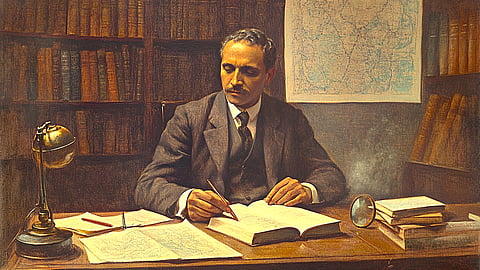- Commentary
- History Vignettes
- Notes on Culture
- Dispatches
- Podcasts
- Indian LanguagesIndian Languages
- Support

IN MY M. A. CLASS a slightly different plan is followed. A list of subjects for essays with “reading” is hung up, but every student has to write on all the subjects in rotation. The language must be English. I correct every essay by calling its writer apart and giving him half an hour of my time. Three hours a week are spent on this work at present, and with a class of 24 students, it is possible to take an essay from each pupil once a month.
The exact citation of authorities in the margin of every paragraph is insisted on, and the expected length and standard of the essays are much higher than in the Vernacular seminar. But these essays are not read out to the whole class, nor is there any ‘speech from the chair’—I mean the professor, at the end.
But the essays are valued and their defects are noted by the professor. Essays based on secondary books, when original authorities or standard histories are available, are rejected. It would be unprofitable to invite the class to discuss the essays before the students have gone through about a year’s training in this way and learnt to distinguish between different authorities, to marshal facts, and to reflect on events, causes and tendencies.
To encourage jejune criticism by youths who speak without previous preparation would be to waste our time. But the preliminary training I have described above is very useful, for, without it the equipping of our graduates for research is impossible.
As things are managed in other colleges, it is possible for a young man to take the M.A. degree in History without knowing the true historian’s first duties,—the compilation of a classified bibliography, penetration to the very fountain-head of information (original sources as distinct from rechauffees) and the exact quotation of chapter and verse for every statement.
So much for what the teachers and the students can do to improve the study of History in our colleges. But it is known all the world over that the method of teaching is influenced by the system of examination. The examiner has certain duties in the matter. He must indicate clearly by his manner of framing questions, and still more by his system of marking answers, that it pays a candidate better to be thorough and fresh in his answers though he may not handle all the questions, than to answer the whole paper on the basis of some crib or summary.
THE REWARD OF ORIGINALITY of thought and rational study must be qualitative and not quantitative. I understand that at the Mathematical Tripos of Cambridge it is possible for a candidate to get a first class by answering only three questions out of eight, provided that his answers reach a high level of quality.
The same principle should be accepted by our Universities and openly announced to the students. It should be made impossible to get a first class by reading “notes” only; and, conversely, no student should miss a first class by reason of the small number of the questions answered, by him, if his paper gives unmistakable proof of freshness of thought and study of sources. At present, we merely count the answers in a paper, and assign more or less marks as the answers are more or less in number. If a paper contains five questions and the candidate answers only three of them, he cannot, under the present practice, stand higher than the very bottom of the first class (60 per cent) and will in all likelihood be placed in the second class, even though his answers reach the height of perfection.
It is difficult to conceive a system more likely to depress originality and sound study and to encourage memory-work and the cultivation of facile mediocrity.
In examinations for the M.A. and Honours degrees, the examiner should be given power to assign marks by weighing the answers instead of counting them. In the case of every paper above the ordinary, they should at their discretion add extra marks (say 15 or 20 out of 100) to the total of the marks gained by the answers individually.
In conducting these examinations during the last four years I have sometimes done so, but I hope my action has not been illegal!
CURATING THIS ESSAY SERIES by Acharya Jadunath Sarkar titled Confessions of a History Teacher has been a rewarding experience for all of us at The Dharma Dispatch.
It clearly is a treasure trove and a masterclass delivered by one of the great masters and pioneers of history writing in India. Jadunath Sarkar’s insights emerge not merely from a fruitful life spent as a teacher, researcher and writer but from the mental make-up of a philospher of history.
Throughout, we also notice his anxiety at the falling standards in the discipline of history in his time. The anxiety should be understood in a more specific context. As a student, Acharya Jadunath Sarkar had trained himself in exacting standards. He was one of the more distinguished recipients of the Premchand Roychand Scholarship award, then considered as the toughest academic prizes to win. Other luminaries who had bagged that award include Prof Ashutosh Mookerjee, Ramendrasundar Trivedi, Ramesh Chandra Majumdar and Surendranath Sen. It was thus unsurprising that Sarkar was greatly alarmed at the trend of readymade “bazaar notes,” which had become popular shortcuts for students to “get marks,” instead of acquiring lasting knowledge.
It would behoove educationists of our own time to take a fresh look at this timeless piece of guidance given by the Acharya.
Series concluded
The Dharma Dispatch is now available on Telegram! For original and insightful narratives on Indian Culture and History, subscribe to us on Telegram.
